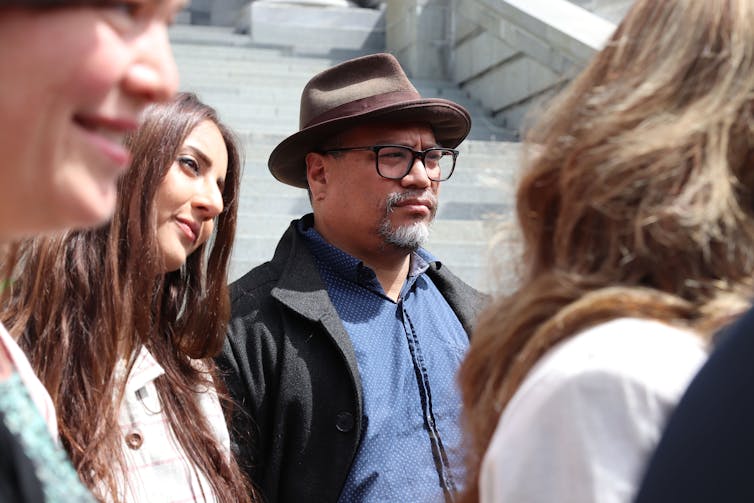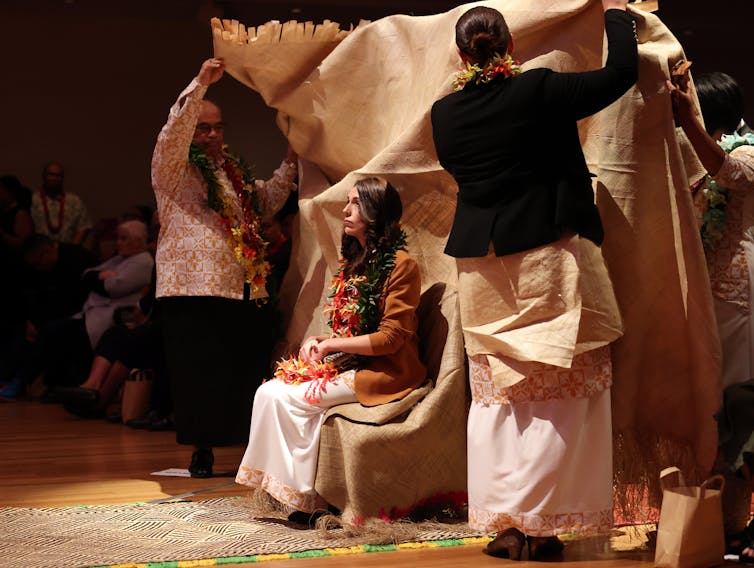The dawn raids of the 1970s, when police descended on Pacific Island households in New Zealand’s main cities to find and deport “overstayers”, remain a scar on New Zealand’s collective memory.
So there was understandable celebration when Green MP Teanau Tuiono’s bill, which aims to overturn a particularly punitive piece of immigration law, passed its first reading in parliament in April this year.
The (somewhat tortuously titled) Restoring Citizenship Removed By Citizenship (Western Samoa) Act 1982 Bill will create a pathway to citizenship for people born in Samoa who were stripped of New Zealand citizenship in 1982. If the bill passes, they won’t have to go through the standard residency and citizenship application processes.
The bill reverses the original law passed in 1982 by the National government of Robert Muldoon. That law targeted people born in Samoa between May 1924 and January 1949 (and family who held citizenship through descent or marriage).
During that period, Samoa was under New Zealand’s administration, and many had come to New Zealand for work and education. The raids terrorised people in their beds, churches, schools and workplaces. They also resulted in the unnecessary placement of children into state care, and ongoing intergenerational fallout.
Public submissions on the bill close at the end of this week. But supporters should be wary of premature celebrations. Because the practice of dawn raids and the traumatic deportation of people for visa breaches continue to this day.

The raids continue
In 2021, following a petition by Benji Timu and Josiah Tualamali'i, the then prime minister, Jacinda Ardern, offered a formal apology to the Pacific community on behalf of the government. Ardern also took part in a traditional Samoan ifoga ceremony of apology.
But the dawn raids apology and new bill do not mean such discriminatory practices are a relic of New Zealand’s past. Raids were happening in the lead-up to Ardern’s apology and did not stop afterwards.
Under the Immigration Act 2009, Immigration New Zealand serves “deportation liability notices” and “deportation orders” to people liable for deportation because of expired visas and “other public interest factors”.
Section 286 of the act allows an immigration officer to “enter and search at any reasonable time by day or night any building or premises in which the officer believes on reasonable grounds that the person named in the notice or order is present”.
An independent review by barrister Mike Heron found no legislative or policy efforts were made after Ardern’s apology to end such raids or change the way Immigration New Zealand sought people for deportation.
Between 2015 and 2023, there were 95 dawn raids resulting in 101 deportations. In one incident in Auckland last year, immigration authorities forcibly removed an “overstayer” Tongan construction worker from his residence at 6am, according to his lawyer, in the presence of his four “terrified […] and very upset” children.
Between 2017 and 2023, 5,511 people were deported or left New Zealand voluntarily after being put on notice they were “unlawfully” in the country. People from Samoa, Tonga, Fiji, Tuvalu and Kiribati make up around a third of this number.

Moving beyond ‘penal nationalism’
Prime Minister Christopher Luxon made it clear while in opposition his government would likely “reserve the option” of immigration raids: “the reality is, you need to be here legally [or] you could be liable for deportation”.
Broadly, this approach to immigration has been described as “penal nationalism”: migration is treated as a threat, and tools such as police raids and detention are used to manage “others”, especially people of colour who seek residence or citizenship.
If the new bill passes, 5,000 people now aged between 75 and 100 will be eligible to have their citizenship restored. But some have argued compensation should be provided as well as, or even instead of, citizenship.
Either way, despite the Heron report urging the government to restrict or ban dawn raids, the current law still allows them to happen.
It perpetuates the historical perception of Pacific workers as “disposable labour”, recruited and ejected when it suits the employer and country. This is despite them having jobs, families and close ties in New Zealand.
Friendship not fear
There need to be viable amnesty systems and pathways for Pacific “overstayers” to legally remain in New Zealand. In the rare cases where deportation is justified, those individuals should still be treated with dignity in accordance with their civil and political rights.
New Zealand should also help the reintegration of deportees in their home countries, where they can face ostracism, cultural and language barriers, and limited employment opportunities.
At the same time, Pacific nations need support for retaining their productive people in the first place, through building economic capacity and public infrastructure.
Until these things are the rule rather than the exception, the “spirit of close friendship” expressed in the 1962 Treaty of Friendship between Samoa and New Zealand remains unrealised.

